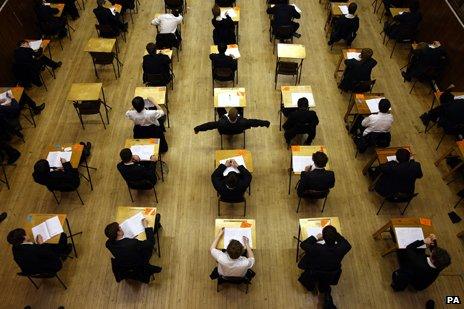UK education: Average won't do
- Published
- comments

The impression created by the OECD's triennial assessment of educational performance - its Programme for International Student Assessment, or Pisa - is that the UK is a slightly lazy and spoiled rich kid, that does a bit of last-minute cramming to scrape a pass, but disappoints relative to its economic advantages.
Or to put it another way, the performance of UK 15-year-olds is pretty average in respect of outcomes - bang on the international average for maths and reading, a bit above in science - but that doesn't look great, given that the UK spends well above the average on education and its students are significantly richer than in many countries where attainment is much higher.
The top of the league table is dominated by Asia, and China in particular: Shanghai, Singapore, Hong Kong, Taipei, Korea, Macao and Japan, in that order.
Which means that the gap between per capita wealth in the rich West and in the developing economies of the East will continue to narrow, all other things being equal, given the link between prosperity and education.
The gap between the mean maths attainment of Shanghai adolescents and British ones is a particularly stunning 24%. That's almost as unbridgeable a gap as between Barcelona FC and AFC Wimbledon in football.
And what is perhaps even more shattering, low achievers in maths represent just 3.8% of Shanghai's total, compared with an OECD average of 23% and 22% in the UK.
A couple of years ago, I spent some time with a Shanghai family, when making my documentary series "How the West Went Bust". The girl student in that family would put almost any western student to shame, with her industry and application.
Or to put it another way, these differential outcomes between places like the UK and Shanghai are not just about the structure and resources of schools, but also about national culture and family values. This Chinese family not only created a study-conducive atmosphere in their small apartment, but were saving a huge share of a small income so that their child could afford to go to the best university.
So if the UK wants to secure a rosier economic future, as much of the necessary work to raise education standards may well have to take place in the home as in the school.
Which is not to say that how the state spends money on education is irrelevant.
It is striking that the UK spends 18% more than the OECD average schooling each child aged between six and 15, for an outcome that is totally average, which rather implies there is something wrong in the schools themselves.
The only positive thing to say about the UK is that the waste of education resources is not as bad - apparently - as in the US, which spends 17% more per student than we do for results that are even worse than ours.
Which implies that most of the developed western economies, with the exception of better-performing Canada, Switzerland, Estonia, Finland and the Netherlands, are in the same handcart to a penurious hell.
For what it is worth, the OECD believes that the most successful education systems are those where there is a huge emphasis on improving the qualities of teachers, and those teachers have considerable autonomy in the classroom. And by the way, it does not believe size of class is all that important.
Certainly in respect of teacher independence, that description of high-performing schools does not sound like the UK.
And the OECD says that more successful countries in education are those that make a huge and successful effort to raise the attainment of underprivileged kids. In this respect the UK is again - you've guessed it - distinctly average.